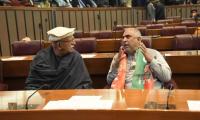Islamabad : Former Finance Minister of Sindh Asad Ali Shah has said that there is a need to focus on digital solutions for transparency of budget making and push for skill development, education, and health sector particularly human capital.
Mr Shah was addressing a hybrid public-private dialogue to discuss ‘Pre-budget proposals and better business regulations’ jointly organised here by Sustainable Development Policy Institute (SDPI) and Institute of Business Administration (IBA), Sukkur.
Stressing on re-examining the entire government tax structure, he said that the government should create an environment for ease of business with reducing the cost of business. He continued that we need to invest in indigenous skill development at the provincial level.
Member Sindh Revenue Board Mushtaq Kazmi informed the participants that most of the business enterprises need to file five taxes which is quite a hassle. Thus, Sindh Revenue Board and other revenue agencies are signing MoU with FBR to have a central portal for a single return for easing of business.
He said that National Tax Council will be advised to reduce the tax rate. Sales tax in terms of collection should be with the provinces, he opined.
Dr Waqar Akram from IBA, Sukkur, emphasised that it is time to think out of the box for ease of business. Business regulations are important to relax the procedures of doing business with small capital. The key to success lies in Research & Development (R&D) and educational institutes could play an important role in market development and strong policy formulation, he added.
Abdul Majid from Sindh Revenue Board was of the view that SBR is improving the ease of business by using Information Technology. Thus, the registration process has been eased and tax collection is being made electronically.
Dr Vaqar Ahmad, Joint Executive Director, SDPI, observed that the upcoming budget should respond to three main challenges such as evaluating why foreign investment inflows are declining and how to capitalise on opportunities arising from Covid-19. Likewise, for post-pandemic recovery, Sindh government will need to expedite disbursements to support micro-enterprises including those in the informal sector as it would be critical for job creation.
Shaista Ayesha from SEED Ventures called for developing the capacity of youth, IT interventions, gender diversity in the focused areas. The registration of business for the women and youth should be simplified and capacity building is required in term of understating formal economy for women youth enterprises, she stressed.
Sajjad Aslam, President, Association of Chartered Certified Accountants, Pakistan, asked to add 10-15 % SMEs to the government procurement rather than focusing on established large-scale businesses.
Consultant Maheen Salman was of the view that the developing local industries will be supportive of the growth of SMEs. Abdul Jabbar, a businessperson, opined that sales taxes should be collected by provinces rather than the federal agency. Tax policy principle is taxes should be low rate, broad-based and predictive wherever possible should be flat, he added.
A one-day workshop on ‘Pronunciation Pedagogy’ at the Allama Iqbal Open University main campus on December 13,...
This representational image shows women looking at handicrafts at a stall. — APP/FileIslamabad : The capital city is...
Pakistan Academy of Letters building. — INP/File Islamabad : The Pakistan Academy of Letters has announced to...
Federal Minister for Privatisation, Board of Investment and Communications Abdul Aleem Khan in a meeting...
This representational image shows the Pakistan Atomic Energy Commission cancer hospital in Ginor. —...
Chairman PMYP Rana Mashhood Ahmed Khan exchanges views with the German Ambassador to Pakistan, Alfred Grannas ...







